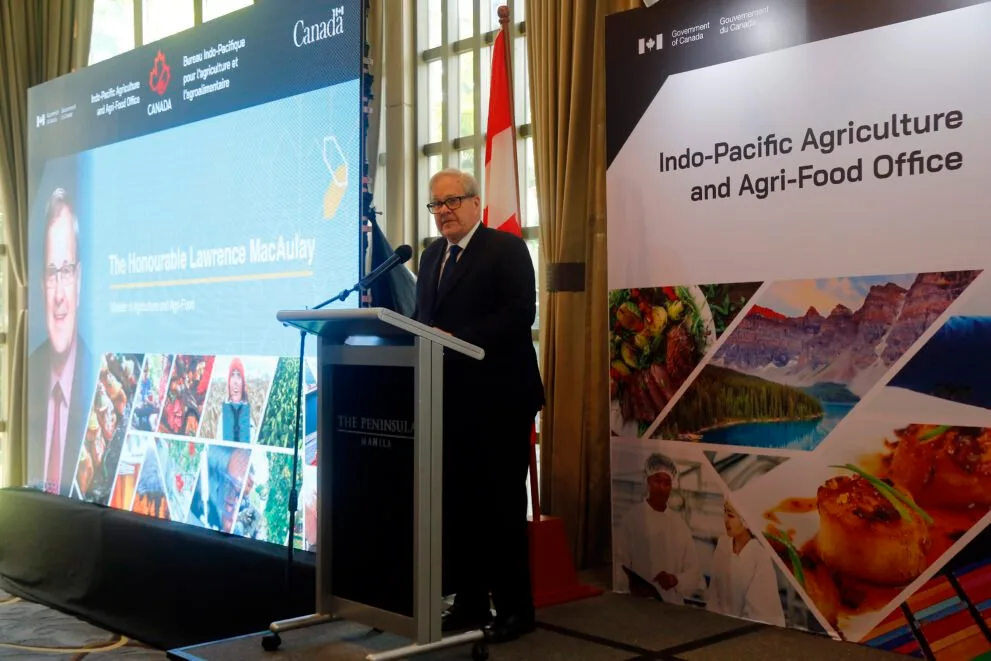Melville – The federal Agriculture and Agri-Food Minister (AAFC) Lawrence MacAulay and Saskatchewan Agriculture Minister David Marit announced details of the 2024 Crop Insurance Program, administered by the Saskatchewan Crop Insurance Corporation (SCIC).
This year’s enhancements build on SCIC’s existing suite of business risk management programs that have demonstrated success in providing support to producers impacted by drought conditions. Over the last three years, this suite of programs has largely responded to weather-related production losses, providing over 6 billion dollars of insurance claims and other program benefits directly to Saskatchewan producers.
For 2024, multi-peril crop insurance average coverage is $389 per acre, a decrease from 2023, largely due to an average decrease in insured commodity prices. As a result, the average premium is also decreasing to $12.71. Producers’ coverage and premiums are individualized to their operation. Coverage reflects each producer’s production records and premium reflects each producer’s claim history.
SCIC’s existing Weather-Based Programs include Forage Rainfall Insurance, the Corn Rainfall Insurance, and Corn Heat Unit Insurance. The rainfall insurance programs provide protection in the event seasonal precipitation is below the long-term average, adjusted for extreme heat. The Corn Heat Unit Insurance Program insures against a shortage of heat units over the growing season. A selection of program options allows producers to tailor coverage to their needs.
Introduced for the 2024 Crop Insurance Program, SCIC’s weather-based programs now provide options to insure intercrops and additional feed crops. The Mixed Forage Rainfall Insurance Program protects any forage feed crop not previously covered under weather-based programs, including mixed forage, greenfeed and silage, if seasonal precipitation is below average. With the Intercrop Rainfall Insurance Program, annual intercrops intended for harvest can now be insured for below average seasonal precipitation.
Additionally, coverage is increasing for the 2024 Forage Rainfall Insurance Program. Coverage levels now better reflect the productive capacity of the insured acres and increased transportation allowance (which recognizes the costs associated with replacing lost feed). Producers can select from three levels of coverage, Low, Medium, and High, offering flexible risk management and related premium cost options.
For 2024, SCIC is pleased to announce an additional 38 weather stations to supplement its existing network. All weather-based programs are enhanced by this increased weather station density province-wide. With 224 weather stations across the province, most land is located within 30 kilometres of at least one weather station. One weather station can be selected for each insured land location. This allows producers to insure each of their land locations with relevant coverage.
March 31, 2024, is the deadline for Saskatchewan producers to apply, reinstate or cancel their Crop Insurance contract. Producers must select insured crops and coverage levels or make additional changes by this date. Producers can speak to their local SCIC office to make any changes or coverage will remain the same as the previous year.
SCIC offers a full suite of programs that can work together to ensure you have every angle covered. These include Crop Insurance, AgriStability, Wildlife Damage Compensation and Prevention Program and Livestock Price Insurance. We encourage producers to review their options and find the right coverage for their operation. For more information, contact a local SCIC office, call 1-888-935-0000 or visit scic.ca.
Crop Insurance is a federal-provincial-producer cost-shared program that helps producers manage production and quality losses. Support for the program is provided by the governments of Canada and Saskatchewan under the Sustainable Canadian Agricultural Partnership (Sustainable CAP).
“As a farmer myself, I know it can be hard to protect your business while continuing to produce the food Canadians and customers around the world rely on. In the face of increasing challenges, it’s vitally important that farmers in Saskatchewan have risk management tools available to them, like crop insurance, to help minimize the economic effects of production losses.” – Lawrence MacAulay, Minister of Agriculture and Agri-Food









